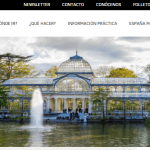Systematising measurement with data is key to increasing the sustainability of the tourism sector, according to the conclusions of the sustainable tourism indicator monitoring report, carried out by SEGITTUR for Sanxenxo City Council.
At a joint event, the mayor of Sanxenxo, Telmo Martín,and the chairman of SEGITTUR, Enrique Martínez, together with the director of the Galician Tourism Agency, Nava Castro, and the president of the City Council of Pontevedra, Carmela Silva, presented the conclusions of the aforementioned report in which the functioning of the monitoring system during its first year of operation was analysed.
The system contains data on water consumption, as well as tourist arrivals, hotel occupancy, air traffic, electricity consumption, waste and passenger mobility.
The system, which is available to all on the Sanxenxo tourism portal, is becoming a key tool in the decision-making process to design measures that will improve energy efficiency and reduce water consumption and CO2 emissions.
According to the chairman of SEGITTUR, this system, which forms part of the Smart Destination project, is aimed at fostering competitiveness and the sustainable transformation of the sector. He also underlined that data analysis is key to obtaining a complete snapshot of the destination, thus helping to improve its management and contributing to more sustainable tourism.
For his part, the mayor of Sanxenxo stressed that “we are clear that if Sanxenxo wants to continue being a leading tourist destination in Northern Spain this will only be possible if we adhere to sustainability and promote the responsible use of basic services.”
Among the conclusions of the report was the fact that 37% of Sanxenxo’s CO2 emissions are due to the weight of tourism, deriving from the impact of mobility and water and waste treatment.
The report also highlighted the need to have a greater disaggregation of data with greater frequency, allowing a more exhaustive analysis.
With regard to the challenges associated with the use of data to promote sustainable tourism, there is a need to systematise the measurement of sustainability and the monitoring of the load capacity for tourism waste.
Other less technological actions can be added, such as the decarbonisation of the sector, through the change of the modal distribution of tourism mobility





